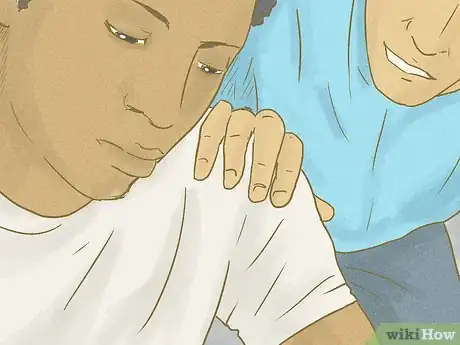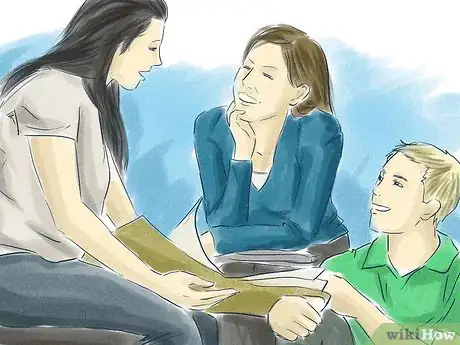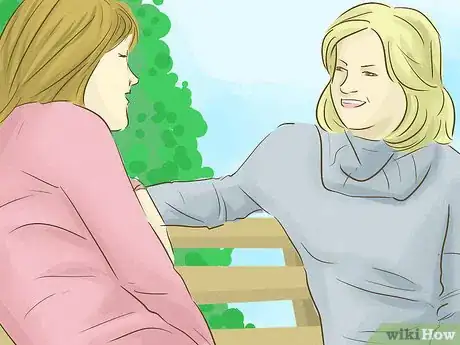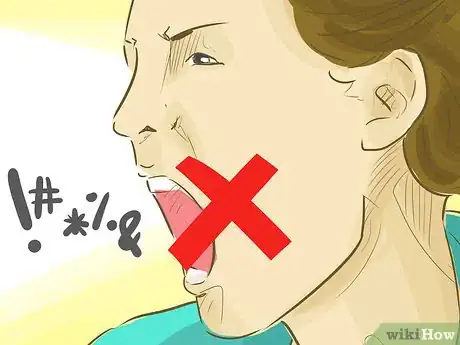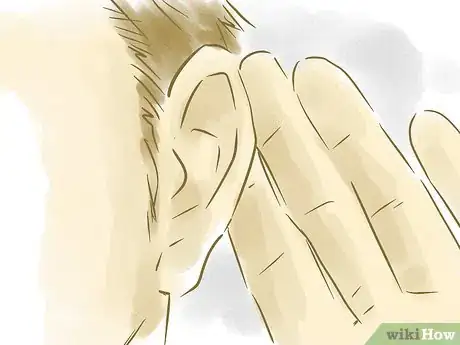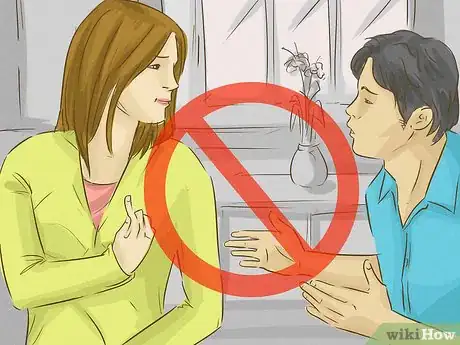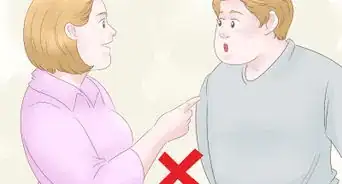This article was co-authored by wikiHow Staff. Our trained team of editors and researchers validate articles for accuracy and comprehensiveness. wikiHow's Content Management Team carefully monitors the work from our editorial staff to ensure that each article is backed by trusted research and meets our high quality standards.
There are 15 references cited in this article, which can be found at the bottom of the page.
This article has been viewed 45,376 times.
Learn more...
Everyone has their own little habits and tendencies that others find annoying, but sometimes they can go too far. Though your friends still like you and want to hang out, your obnoxious behavior may make them concerned at times. However, if you’re interested in correcting this behavior, you should work to be humble, control your gestures, and communicate better and more kindly.
Steps
Practicing Humility
-
1Admit your faults to yourself. Before you can fix your behavior, you must admit it first. Nobody likes to admit their faults, but by admitting the problem, you're making yourself conscious that, "OK, I have a problem, but I'm going to try my best to fix it." Admit your mistakes without blaming anybody else, and don't be too hard on yourself. Not only will this help you improve, but it will show an increase in maturity, by accepting your faults.[1]
- Consider making a list of the things you have done in the past that others have called annoying.
- Think on all the ways that you have directly hurt someone’s feelings because of your obnoxious behavior.
-
2Apologize to others. If, from thinking back on your bad behavior, you discover that you have behaved in ways that have hurt your friends or family, and you have never apologized for that, you should take the time to do so. Prepare a heartfelt and genuine apology and set aside some time to communicate this to them.[2]
- Try to talk somewhere quiet and away from others.
- If necessary, you can talk to them on the phone, but in person is better.
- You can say something like, “I wanted to let you know that I have taken some time recently to think about myself. I recognize that I can be really harsh sometimes, and that you end up on the receiving end of that. I wanted to say that I’m so sorry, and I’m going to work on being a better person.”
Advertisement -
3Don’t brag or be arrogant. One of the most obnoxious behaviors that a person can exhibit is by being a bragger. Some people feel the need constantly tell others good things about themselves in a showy way, because in reality, they are very self conscious. However, you should make an effort to not toot your own horn very often.[3]
- There are certain instances when sharing accomplishments is both necessary and important, however. For instance, if you have recently gotten into college, you will want to share that with your friends.
- One thing to avoid saying is “I have a bigger house than you.” Any compliment to yourself that exists in comparison to others should be avoided.
-
4Show compassion to others. Your friends love you, and you love your friends as well. Rather than being mean or aggressive with them, work to actively show them compassion and empathy. If they are having a hard time at home, take them out for ice cream so they can vent. If they are struggling in their classes, see if you can offer any tutoring.[4]
- Try to think of things more from their perspective instead of thinking only from your own.
- Remember that you don’t know everything. One other obnoxious behavior that is a sure way to frustrate anyone is by acting as if you know everything. Remember that the things that you know are minute and pale in comparison to the wealth of knowledge that is in the world. Not only do you not know everything, but it is impossible for you to. If your friend tells you something and they are not known to be a liar, accept the information and move on.
- If your friend is particularly knowledgeable about a specific topic, trust that knowledge, especially if you know very little about it.
- Avoid arguments with friends over trivial matters.
-
5Remember that it’s not all about you. The world does not revolve around you, just as it does not revolve around anyone else. Don’t make everything about you, even if you feel that it is. Take a moment to step back from situations and don’t take everything personally.[5]
-
6Determine if there are any underlying issues. Many people are annoying due to feelings of anxiety or insecurity. Others have a hard time reading social cues and are unaware to tell if others are offended or bored. If you feel that any of these issues speak to you personally, you might want to consider seeking out an expert, like a doctor or a counselor.[6]
Monitoring your Body Language
-
1Smile more. One way to overcome your obnoxious demeanor is by replacing your negative body language with positive. A great way to do this is to smile more. Smiling makes people see you as warm, friendly and inviting, which is exactly the disposition that you’re looking for if you’re going to change your image.[7]
- Try to frown less, as well.
-
2Try to get rid of your bad habits. Perhaps, you just have a few obnoxious habits that are annoying to others that you are looking to get rid of. For instance, if you chew your gum loudly or have any other tics that really bother people, work to actively get rid of those behaviors. If you can manage to stomp them out, people will feel less frustrated around you.[8]
- It can be difficult to get rid of these habits, especially if you have done them for a while. But just hold firm to your commitment, and eventually you will kick it.
-
3Don’t take up unnecessary space. One other behavior that is obnoxious is taking up way more space than is necessary. This comes from thinking of yourself as being overly important and not taking others needs or space into consideration. Maybe on the bus, you sit with your legs spread wide, and it makes less room for others to sit near you. Or maybe when talking to others, you use your hands and others have to stand far back from you. Adjust these behaviors and give equal room to others.
- Practice self awareness. Take note of your behavior and watch how people respond or don’t respond to you.[9]
-
4Keep an open body posture. There is a tendency, even amongst people who are not obnoxious, to cross your legs or arms when sitting. However, doing so can make you look closed off, or even mean. Sit and stand in a way that communicates that you are kind and inviting. Stand with your arms uncrossed, sit with your legs uncrossed and knees together, or slightly apart. Keep your hands open and visible.[10]
- Don’t roll your eyes.
-
5Don’t be too loud. Another way that obnoxious people annoy others is by being very loud in conversation. If you do this as well, work to actively keep your voice down. You should not resort to whispering, however, but instead maintaining a respectful tone.
Developing Gentler Communication Skills
-
1Listen to others. One key aspect to overcoming your obnoxious behavior is to actively, and respectfully listen to others when they are speaking. Obnoxious people often only listen, respond, or, even worse, to interrupt. While your friend is speaking, keep your thoughts and comments to yourself until they have finished speaking. Think carefully about their words and try to stay focused.[11]
-
2Be honest, but not mean. There is a difference between being truthful and genuine, rather than being downright rude. Consider if what you want to say is truly necessary. If you have a tendency to be rude or insulting, actively work to eradicate that behavior. Choose your words carefully and season any uncomfortable truths with some sweetness.[12]
- For instance, if your friend is struggling with breaking up with his/her boyfriend/girlfriend, don’t say something like, “you are so dumb for staying with them, of course you should break up.” Instead you can say, “I know you love them, but seeing them hurt you over and over makes me think they are not a good lover for you. But I will love you and support you no matter what you decide.”
-
3Be more positive. Negative talk can be draining for your friends and family, as it is likely affecting them more than you are aware of. If you are constantly thinking of the glass as half empty, or making disparaging comments about others and/or yourself, realize that people don’t tend to enjoy being around people like that.[13]
- Take some time to reflect on all of the positive things and/or people in your life. This will help you be more grateful and pleasant to be around.
-
4Don’t interrupt someone when they’re speaking. Though you may get excited when in conversation with someone, hold your comment to yourself until they are done speaking. Interrupting someone is a surefire way to put them on guard and make them feel annoyed with you.[14]
-
5Avoid giving advice unless asked. Another behavior that is obnoxious is when people inject advice into situations where it was not asked for, or solicited. Remember that you are not the expert on the your friend’s life, and though you have their best interests at heart, you don’t necessarily know what’s best for them. Remember that, and allow them to make their own choices.[15]
- Offer advice when asked.
-
6Ask your friends how you can improve. You may be doing things that are annoying that you have no idea about. Get some clarity from your family and friends about your behavior, ask them to be truthful, and work to improve on the areas that you find important. [16]
- You might say something to them like, “I know that you say I'm annoying sometimes, but I was wondering, how am I annoying? I’m trying to work on being less obnoxious.”
References
- ↑ https://hbr.org/tip/2019/02/when-you-make-a-mistake-be-quick-to-admit-it
- ↑ https://au.reachout.com/articles/how-to-say-sorry-and-mean-it
- ↑ https://pairedlife.com/etiquette/How-to-Stop-Yourself-from-Annoying-Your-Friends
- ↑ https://greatergood.berkeley.edu/article/item/six_habits_of_highly_compassionate_people
- ↑ https://www.psychologytoday.com/us/blog/valley-girl-brain/201303/6-ways-stop-being-annoying
- ↑ https://www.helpguide.org/articles/mental-health/finding-a-therapist-who-can-help-you-heal.htm
- ↑ https://www.psychologytoday.com/blog/valley-girl-brain/201303/6-ways-stop-being-annoying
- ↑ https://www.psychologytoday.com/us/blog/fixing-families/201712/how-break-bad-habits
- ↑ https://www.psychologytoday.com/us/blog/click-here-happiness/201903/what-is-self-awareness-and-how-do-you-get-it
- ↑ https://www.helpguide.org/articles/relationships-communication/nonverbal-communication.htm
- ↑ https://www.psychologytoday.com/blog/valley-girl-brain/201303/6-ways-stop-being-annoying
- ↑ https://www.psychologytoday.com/us/blog/your-emotional-meter/201902/how-be-truthful-without-being-hurtful
- ↑ https://www.psychologytoday.com/us/blog/hope-relationships/201409/6-ways-become-more-positive-today
- ↑ https://www.huffingtonpost.ca/rhonda-scharf/bad-habits-interruptions-_b_7621516.html
- ↑ https://psychcentral.com/blog/imperfect/2020/02/its-time-to-stop-giving-unsolicited-advice
- ↑ https://www.psychologytoday.com/us/blog/tracking-wonder/202002/4-tips-effectively-ask-help-and-get-yes



